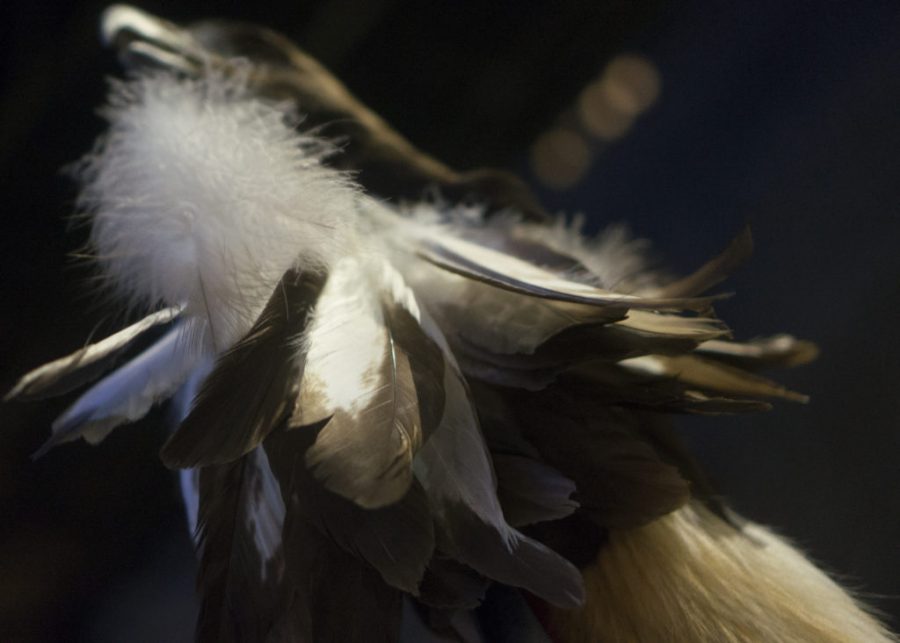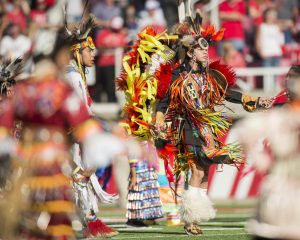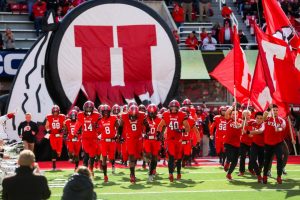Barron: Keep Talking about Re-Nicknaming the U
The Native American eagle headdress that was displayed on stage during the Solidarity Rally against racism at Washington Square Park in Salt Lake City, Utah on Monday, Aug. 14, 2017. (Rishi Deka | Daily Utah Chronicle)
August 25, 2020
In late June, the Salt Lake Tribune published an opinion piece by Christopher Mead, a University of Utah employee, arguing that the U needs to retire the Ute nickname as our communities reckon with their white supremacist history. Citing the history of the nickname’s evolution on campus, Mead argued that the continued use of the tribe’s iconography hurts indigenous people more than the memorandum of understanding benefits them. In response, Luke Duncan, the chairman of the Ute Indian Tribe Business Committee, published a piece condemning Mead for raising the issue on behalf of the Ute tribe. As Duncan writes, only the Ute Tribe is empowered to speak on its behalf, however, this fact should not stifle conversations about the continued use of the Ute nickname and its impact on indigenous people.
Last fall break, I was sitting on a plane behind a first-year U student and heard him talking to the stewardess about football. Wondering aloud if her team plays the U, she asked what the U’s mascot was. His prompt reply, “Our mascot is the Ute.” As the university’s athletic teams are always referred to as the Utah Utes, never as the Utah red-tailed hawks, his confusion is understandable. Indeed, an opinion writer for the Daily Utah Chronicle predicted it in 1986, writing, “As long as our athletic teams are called the Utes, the Ute will be considered a mascot.” While Ute is not derogatory, using a tribe’s name as our university’s nickname and de facto mascot is still harmful to native people.
In a report commissioned by the Oneida Indian Nation, researchers found that American Indians experience psychological distress when viewing teams with an American Indian name or mascot. Studies show that the presence of these nicknames and mascots directly results in lower self-esteem within indigenous populations and increased negative associations of American Indians among non-native groups. These effects occur regardless of whether the mascot or team name is considered offensive or a slur. As Dr. Stephanie Fryberg explains, “American Indian mascots are harmful not only because they are often negative, but because they remind American Indians of the limited ways in which others see them. This in turn restricts the number of ways American Indians can see themselves.“
While the U has committed to increasing educational access for indigenous students, continuing to use the Ute nickname undercuts these efforts — indigenous students have indicated that mascots negatively impact their educational experience. When asked about the University of North Dakota’s Fighting Sioux mascot, indigenous students reported that the mascot led them to feel tense in their classes, experience increased stress, avoid university athletic events and worry about their personal safety. Sadly, Native American students are already at an educational disadvantage due to discrimination within the United States educational system. The U is first and foremost an educational institution and no mascot, name or campus traditions are worth jeopardizing students’ educational experiences.
In 2018, Washington State University announced they would penalize anyone utilizing the Ute moniker and banned the use of the drum and feathers logo on their campus. This change was not done to undercut the Ute Tribe’s right to license their name, but instead to ensure no WSU student was uncomfortable attending games or felt misrepresented at university events. While the Ute Tribe can renew their naming agreement with the U, they are not the sole stakeholders in the continued use of the Ute nickname. Other voices, perspectives and research must be part of this conversation as this decision impacts all indigenous people.
I am a white student and I cannot speak to the experience of Utah’s indigenous people nor can I speak on their behalf. Yet research — including studies commissioned by Native American tribes — paints a clear picture that using the Ute name as the university’s nickname is harmful to indigenous people, especially indigenous students. While the Ute Indian Tribe has the absolute right to allow the U to utilize their name, students have a responsibility to ensure our university’s culture does not negatively affect our peers, potential students, and community members. In the past, students have played a key part in the evolution of the U’s mascots and nicknames. Current students can continue this legacy through simple action like choosing to say “Go Utah” instead of “Go Utes,” calling out community members who appropriate American Indian culture and respectfully participating in the debate on the continued use of the Ute name.











Lynda Maxfield • Oct 31, 2020 at 1:13 pm
This is a well argued Morgan. Utah’s history is full of racial inequity and injustice. Going forward, it’s vital to consider how University decisions regarding this issue will impact all current and future stakeholders.
Liner • Sep 8, 2020 at 10:21 am
I find it interesting that someone with such strong opinions on injustice etc, still refers to a flight attendant as a stewardess.
Kali • Sep 4, 2020 at 5:48 pm
If this is supposed to celebrate Ute culture and recognize the Ute Tribe so they are not “forgotten”, why doesn’t the U actually celebrate their culture by using their language? What if our team was the Ute word for red-tailed hawks? Language and culture are deeply rooted together. Then people wouldn’t associate the mascot for a group of people anymore.
R Byron • Sep 3, 2020 at 4:37 pm
Flight attendant… not “stewardess”